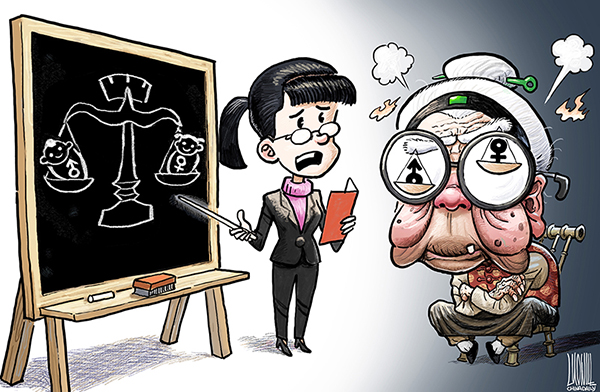Gender bias is the result of twisted male mindset
By Wang Yiqing | China Daily | Updated: 2017-11-29 08:12
 |
Wen Rumin, chief editor of the official Chinese textbooks, has sparked a heated debate by answering in the affirmative to the above question. The reason: "schoolboys read widely while many schoolgirls only read romantic or inspirational books".
There is no proof, however, to show that schoolgirls read less or only a narrow range of subjects compared with schoolboys. Even if a particular reading taste creates "bookworms" that will find it more difficult to get high scores in gaokao, why do these "bookworms" have to be only girls?
China has made great achievements in establishing gender equality. Public policies, regulations and laws guaranteeing gender equality have curbed many overt gender discriminations, at least in the public sphere. But the social atmosphere and the mindset of all the people don't seem to have changed much. As a result, gender discrimination is still evident in our society.
But it is pathetic to see a senior scholar, especially a top educator who is in charge of compiling textbooks for students nationwide, display such discrimination against women and girls. If the educators are biased against female students, and take "girls are intellectually inferior to boys" for granted, how can we guarantee that female students will be treated equally, and not as inferior to boys, in school?
From the ancient to the modern times, the claim that "women's intelligence is inferior to men's" has been the accepted social construct without any scientific proof, which has its origin in gender discrimination.
For thousands of years in China, only men were qualified and considered to have the capability to read and understand "the books of sages". While after the impact of science and engineering on modern societies thanks to the Industrial Revolution, women have been "unquestionably" good at only the liberal arts, and not science and engineering, because they are only good at "reading" books.
This gender stereotype has discouraged women from releasing their full potential and pursuing excellence in many academic fields, because they are told by the elders from a very early age that "some fields belong to boys" and that they are "intellectually inferior to boys".
Some forms of gender discrimination are unconscious acts that even the most conscious and "well-intentioned" elders commit, unknowingly though-for example, some teachers suggest girls opt for the liberal arts, and some people, always men, suggest that "special" capacious parking lots be built for woman drivers.
A study conducted by four American scientists, Sara M. Lindberg, Janet Shibley Hyde and Jennifer L. Peterson of the University of Wisconsin, and Marcia C. Linn of the University of California, Berkeley, in 2010, showed that between 1999 to 2007, the average mathematic scores of boys and girls from grade 2 to grade 11 showed only slight variations. Yet the number of woman mathematicians is small. The scientists say in their report that policy decisions, such as funding for some same-sex education, as well as the continuing stereotype that girls and women lack mathematical ability, calls for up-to-date information about gender differences in mathematical performance. Such stereotypes can discourage women from entering or persisting in careers in science, technology, engineering and math.
It is therefore illogical for people to use stereotypes to declare women intellectually inferiority to men. Belittling one-half of the human race is unwise, to say the least.
Chairman Mao Zedong said women hold up half the sky, which indeed they do and are thus equal to men, especially given their contribution to society as a whole. Changing this stereotype will enable women to fulfill their full potential, which will not only be conducive to "political correctness" but also to the overall interest of society.
The author is a writer with China Daily. wangyiqing@chinadaily.com.cn
























